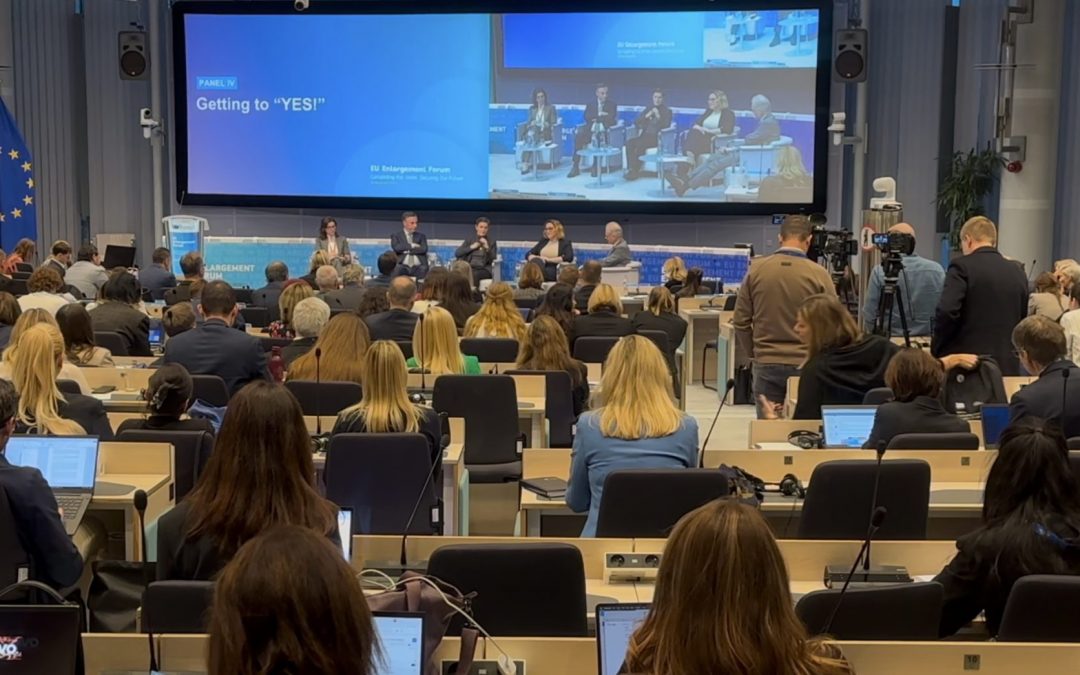BRUSSELS – The President of the National Assembly of Serbia, Ana Brnabić, stated today in Brussels that Serbia needs to take advantage of the good momentum in the European Union’s enlargement agenda, that it will fight for the opening of Cluster 3 in the accession negotiations with the EU by the end of the year, but also emphasized that only through the efforts of the entire society can Serbia progress towards EU membership. After the conclusion of the first conference on the topic of EU enlargement, organized by the European Commission, specifically by the Commissioner for Enlargement, Olivér Várhelyi, and his team, Brnabić told reporters that the President of the European Commission, Ursula von der Leyen, and the President of the European Council, Antonio Costa, also addressed the conference. She noted that countries that are candidates for membership participated, as well as EU member states represented mainly by foreign ministers or ministers for European integration.
“This really speaks to a new momentum in the EU enlargement agenda, which, I believe, is something that should encourage all of us and is truly a unique event that I attended in such an organization and in that format,” Brnabić stated.
She emphasized that it is completely clear that Serbia still has a lot to do to open all clusters.
“We are continuing to fight for the opening of Cluster 3 and I hope we will succeed by the end of this year, and then of course all other clusters so that we can take advantage of this momentum that the European Union has for enlargement,” Brnabić said.
She added that only together can we progress in European integration. “We can only do this together. So, all those who are for Serbia’s European integration, regardless of their differences, if we want to progress, we must work together. Therefore, we need to set aside all other political differences and work together. Both representatives of the former government and civil society organizations, so whoever is for Serbia’s European integration, we must set aside all other differences,” Brnabić said. She added that the EU cannot help us in this, but that, as she said, President of Serbia Aleksandar Vučić always calls for dialogue and hopes that we will work this way. When asked by reporters whether alignment with the EU’s foreign and security policy is a basis for further progress in Euro-integration, as well as the introduction of sanctions against Russia, Brnabić replied that Serbia currently has a record high alignment percentage with the EU’s foreign and security policy of over 65 percent. “This is something that is an important and significant piece of information. Serbia will continue to implement reforms, and we also expect a lot of understanding from our European partners for all the challenges we face on our European path,” Brnabić emphasized.
She added that the initial agreement was that during the Euro-integration process, Serbia would gradually align its foreign policy with the EU’s foreign and security policy until it becomes a full member. “We have seen that this can go exceptionally fast, for example in the case of Albania, which opened all clusters yesterday. So, let’s see that level of understanding from the European Union towards Serbia. Then we will move forward together in a partnership, and when we become a full member of the European Union, we will fully align,” Brnabić said. She emphasized that everyone in Serbia should work together on reforms. “I think we all need to look each other in the eye and say that we are practically the only country where we trip each other up, while we all say we are for the European Union,” Brnabić said. (November 18)
 go to the original language article
go to the original language article
